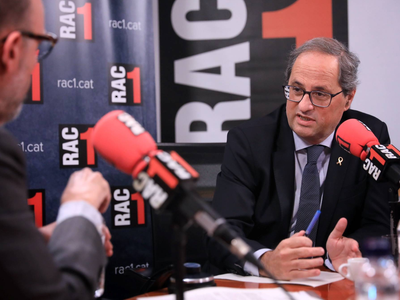- In an interview on El Món a Rac1, the head of the executive insisted that there can’t be a vote in favour of the investiture of Pedro Sánchez unless a negotiating table is first established to address substantial issues
- The president argued that it is “entrenched problems”, such as Catalonia’s “unsustainable fiscal deficit”, that hurt the economy

In an interview on the radio programme El Món a Rac1 this morning, the president of the Government of Catalonia, Quim Torra, argued that the decision as to whether he should be banned from holding public office following a trial for disobedience depends solely on the Catalan parliament. “I don’t take it as given that I’m going to be banned from public office. Moreover, as I said in my closing statement, the body that has the power to impose such a ban is the Parliament of Catalonia, which is where the sovereignty of the Catalan people lies,” he said.
“With strong institutions, a budget and a clear path ahead, we’re well positioned to continue moving forward. As long as I have the confidence of Parliament and the strength to lead Catalonia to the goal of independence, I’ll stay in office. Those are the only conditions as far as I’m concerned.” Torra insisted that he has a duty to continue as the head of the government and said he will “try to forge strategic unity, putting the state against the ropes of democracy and justice”.
After ruling out an early election, the president defended the strength of his executive and said he was “fully confident” that the budget would be approved in December and presented in January. According to the president, this is a matter of vital importance for Catalonia, and the government has a responsibility to make it happen.
A negotiating table with substance
In response to a question about the investiture of Pedro Sánchez, President Torra said that nothing has changed since the last vote, and that in order to vote in favour, “we need to know what commitments the government of Spain intends to make” and see a clear proposal for Catalonia. “We can’t give away our votes without first establishing a negotiating table. And we have to talk about the substance of negotiations,” said the head of the executive, stressing that talks should start without any preconditions.
Torra said he had not seen any step forward in the draft agreement between the PSOE and Unidas Podemos, and that he has asked for clear specifics concerning point 9 of the initial document presented, which calls for dialogue within the framework of the Spanish Constitution to address the conflict with Catalonia. He also appealed to the party led by Pablo Iglesias “not to back away from what they’ve always defended: Catalonia’s right of self-determination” and to talk about “political prisoners” in the Council of Ministers.
“It’s Catalonia’s unsustainable fiscal deficit that hurts the economy”
In reference to protests sparked by the ruling in the 1 October referendum trial, Torra said they had not affected the productive economy, just as protests by taxi drivers in Barcelona or air-traffic controllers at Barcelona–El Prat Airport had little or no impact. According to the president, “entrenched problems” are what hurt the economy. “The root problem is Catalonia’s unsustainable fiscal deficit.” In this context, he cited the €44 million that leaves Catalonia every day and does not return, a lack of basic infrastructure such as the Mediterranean Corridor, and the fact that budgetary investment in Catalonia by the state is “outrageously low”.
For all these reasons, Torra rejected criticism of the protests by Josep Sánchez-Llibre, president of the Catalan employers’ association Foment del Treball, and urged him to speak out against Catalonia’s fiscal deficit “for the good of all Catalan businesspeople”.
The president also argued that citizens have every right to engage in civil disobedience. “In Catalonia, we have to respect security, free movement of people and goods, and the right to protest. I won’t be the one to restrict anyone’s rights,” he concluded.